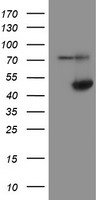ADH7 Mouse Monoclonal Antibody [Clone ID: OTI2H10]
CAT#: TA504873
ADH7 mouse monoclonal antibody, clone OTI2H10 (formerly 2H10)
Size: 30 ul
Formulation: Carrier-Free
View other "OTI2H10" antibodies (4)
Need it in bulk or conjugated?
Get a free quote
CNY 1,999.00
CNY 2,700.00
CNY 3,080.00
CNY 300.00
CNY 1,430.00
CNY 2,900.00
CNY 6,650.00
CNY 9,998.00
Specifications
| Product Data | |
| Clone Name | OTI2H10 |
| Applications | FC, IHC, WB |
| Recommend Dilution | WB 1:500~2000, IHC 1:150, FLOW 1:100 |
| Reactivity | Human, Mouse, Rat |
| Host | Mouse |
| Clonality | Monoclonal |
| Immunogen | Full length human recombinant protein of human ADH7(NP_000664) produced in HEK293T cell. |
| Formulation | PBS (pH 7.3) containing 1% BSA, 50% glycerol and 0.02% sodium azide. |
| Concentration | 1 mg/ml |
| Purification | Purified from mouse ascites fluids or tissue culture supernatant by affinity chromatography (protein A/G) |
| Conjugation | Unconjugated |
| Storage Condition | Store at -20°C as received. |
| Predicted Protein Size | 41.3 kDa |
| Gene Name | alcohol dehydrogenase 7 (class IV), mu or sigma polypeptide |
| Database Link | |
| Background | This gene encodes class IV alcohol dehydrogenase 7 mu or sigma subunit, which is a member of the alcohol dehydrogenase family. Members of this family metabolize a wide variety of substrates, including ethanol, retinol, other aliphatic alcohols, hydroxysteroids, and lipid peroxidation products. The enzyme encoded by this gene is inefficient in ethanol oxidation, but is the most active as a retinol dehydrogenase; thus it may participate in the synthesis of retinoic acid, a hormone important for cellular differentiation. The expression of this gene is much more abundant in stomach than liver, thus differing from the other known gene family members. Alternative splicing results in multiple transcript variants. [provided by RefSeq] |
| Synonyms | ADH4 |
| Reference Data | |
| Protein Families | Druggable Genome |
| Protein Pathways | Drug metabolism - cytochrome P450, Fatty acid metabolism, Glycolysis / Gluconeogenesis, Metabolic pathways, Metabolism of xenobiotics by cytochrome P450, Retinol metabolism, Tyrosine metabolism |
Documents
| Product Manuals |
| FAQs |
| SDS |
Resources
| 抗体相关资料 |
Other Versions
| SKU | Description | Size | Price |
|---|---|---|---|
| CF504873 | Carrier-free (BSA/glycerol-free) ADH7 mouse monoclonal antibody, clone OTI2H10 (formerly 2H10) |
CNY 3,999.00 |
|
| TA504873AM | ADH7 mouse monoclonal antibody,clone 2H10, Biotinylated |
CNY 3,990.00 |
|
| TA504873BM | ADH7 mouse monoclonal antibody,clone 2H10, HRP conjugated |
CNY 3,990.00 |
|
| TA504873S | ADH7 mouse monoclonal antibody, clone OTI2H10 (formerly 2H10) |
CNY 800.00 |


 United States
United States
 Germany
Germany
 Japan
Japan
 United Kingdom
United Kingdom
 China
China






